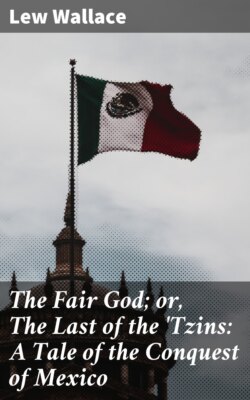Читать книгу The Fair God; or, The Last of the 'Tzins: A Tale of the Conquest of Mexico - Lew Wallace - Страница 22
На сайте Литреса книга снята с продажи.
Оглавление“I am not surprised that I have enemies,” said Iztlil’, calmly. “I will abuse no one on that account; for I am an enemy, and can forgive in others what I deem virtue in myself. But it moves me greatly, O king, that my enemies should steal into your palace, and, in my absence, wrong me in your opinion. But pardon me; I did not come to defend myself—”
“You have taken my words in an evil sense,” interposed the king, with an impatient gesture.
“Or to conceal the truth,” the Tezcucan continued. “There is kingly blood in me, and I dare speak as my father’s son. So if they said merely that I was dissatisfied with your judgment, they said truly.”
Montezuma frowned.
“I intend my words to be respectful, most mighty king. A common wisdom teaches us to respect the brave man and dread the coward. And there is not in your garden a flower as beautiful, nor in your power a privilege as precious, as free speech; and it would sound ill of one so great and secure as my father’s friend if he permitted in the streets and in the farmer’s hut what he forbade in his palace. I spoke of dissatisfaction; but think not it was because you gave Tezcuco to my brother, and to me the bare hills that have scarcely herbage enough for a wolf-covert. I am less a prince than a warrior; all places are alike to me; the earth affords me royal slumber, while no jewelled canopy is equal to the starred heavens; and as there is a weakness in pleasant memories, I have none. To such as I am, O king, what matters a barren hill or a proud palace? I murmured, nay, I did more, because, in judging my quarrel, you overthrew the independence of my country. When my father visited you from across the lake, he was not accustomed to stand before you, or hide his kingly robes beneath a slave’s garb.”
Montezuma half started from his seat. “Holy gods! Is rebellion so bold?”
“I meant no disrespect, great king. I only sought to justify myself, and in your royal presence say what I have thought while fighting under your banner. But, without more abuse of your patience, I will to my purpose, especially as I came for peace and friendship.”
“The son of my friend forgets that I have ways to make peace without treating for it,” said the king.
The Tezcucan smothered an angry reply.
“By service done, I have shown a disposition to serve you, O king. Very soon every warrior will be needed. A throne may be laid amid hymns and priestly prayers, yet have no strength; to endure, it must rest upon the allegiance of love. Though I have spoken unpleasant words, I came to ask that, by a simple boon, you give me cause to love. I have reflected that I, too, am of royal blood, and, as the son of a king, may lead your armies, and look for alliance in your house. By marriage, O king, I desire, come good or evil, to link my fortune to yours.”
Montezuma’s countenance was stolid; no eye could have detected upon it so much as surprise. He quietly asked, “Which of my daughters has found favor in your eyes?”
“They are all beautiful, but only one of them is fitted for a warrior’s wife.”
“Tula?”
Iztlil’ bowed.
“She is dear to me,” said the king, softly, “dearer than a city; she is holy as a temple, and lovelier than the morning; her voice is sweet as the summer wind, and her presence as the summer itself. Have you spoken to her of this thing?”
“I love her, so that her love is nothing to me. Her feelings are her own, but she is yours; and you are more powerful to give than she to withhold.”
“Well, well,” said the monarch, after a little thought; “in my realm there are none of better quality than the children of ’Hualpilli—none from whom such demand is as proper. Yet it is worthy deliberation. It is true, I have the power to bestow, but there are others who have the right to be consulted. I study the happiness of my people, and it were unnatural if I cared less for that of my children. So leave me now, but take with you, brave prince, the assurance that I am friendly to your suit. The gods go with you!”
And Iztlil’, after a low obeisance, withdrew; and then the overture was fully discussed. Montezuma spoke freely, welcoming the opportunity of securing the bold, free-spoken cacique, and seeing in the demand only a question of policy. As might be expected, the ancients made no opposition; they could see no danger in the alliance, and had no care for the parties. It was policy.
